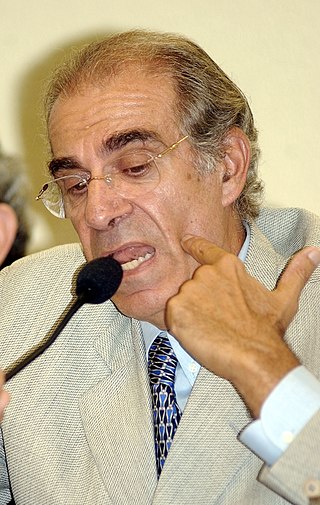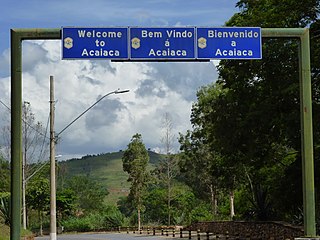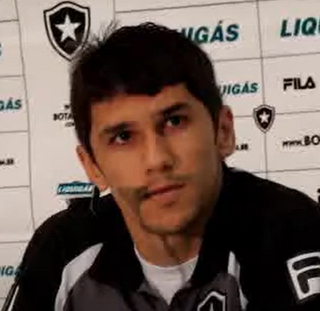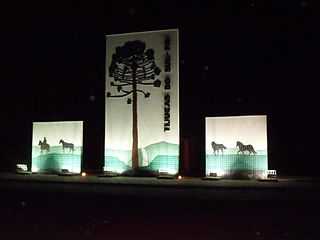Talian, or Brazilian Venetian, or Vêneto is a Venetian dialect spoken primarily in the Serra Gaúcha region in the northeast of the state of Rio Grande do Sul in Brazil. It is also spoken in other parts of Rio Grande do Sul, as well as in parts of Espírito Santo and of Santa Catarina.

Paranaguá is a city in the state of Paraná in Brazil. Founded in 1648, it is Paraná's oldest city. It is known for the Port of Paranaguá, which serves as both the sea link for Curitiba, 110 kilometres (68 mi) to the west and the capital of Paraná, and as one of the largest ports of Brazil.

Celso Augusto Daniel was the mayor in 2002 for the third time of the city of Santo André in São Paulo, Brazil, as a representative of the Workers' Party (PT). He was kidnapped and murdered in the same year.

Portuguese is the official and national language of Brazil, being widely spoken by nearly all of its population. Brazil is the most populous Portuguese-speaking country in the world, with its lands comprising the majority of Portugal's former colonial holdings in the Americas.

Guaratuba is a city in the state of Paraná, Brazil. Founded on 1765, it is considered to be one of the most beautiful beaches of Paraná.

Lúcio Flávio dos Santos, known as Lúcio Flávio, is a Brazilian football coach and former player who played as an attacking midfielder.

Domingão do Faustão was a Brazilian TV show aired every Sunday from 1989 to 2021. Produced by Rede Globo and hosted by Fausto Silva, it featured live music performances as well as special segments, such as the Dança dos Famosos and Dança no Gelo. It was one of the oldest and most famous of Globo's television shows since its first broadcast in 1989.

The Pedreira Paulo Leminski is a 25,000-capacity outdoor concert venue located in Curitiba, Brazil. It was partly named after Paulo Leminski, a twentieth century Brazilian writer, and because it served as the Municipal Pedreira, or rock quarry. Located in the neighborhood of Abranches, the site is about 103,500 metres (339,600 ft) long, its stage is around 480 square metres (5,200 sq ft), and it is surrounded by a rock wall 30-metre-high (98 ft). It was first opened in 1990.

Tijucas do Sul is a municipality in the state of Paraná in the Southern Region of Brazil. It is known for its horse ranches and attracts tourists all year round.

Events in the year 1992 in Brazil.
Pablo Thiago Ferreira Thomaz, known as Pablo Thomaz, is a Brazilian footballer who plays as a forward for Guarani on loan from CEOV.

Unsoul is a Brazilian supernatural drama web television series, written by Ana Paula Maia, and broadcast by Globoplay since October 21, 2020.
The Altamira child emasculations refers to a series of crimes that occurred in the municipality of Altamira, in Pará, Brazil, which involved boys aged 8–14. They were kidnapped, maimed and killed between 1989 and 1993. According to the Pará authorities, the crimes were committed for the purpose of satanic rituals and black magic, promoted by the "Superior Universal Lineage" sect, a mystical organization that, among other things, challenged the Western idea of divinity. However, after the case was closed, Maranhão police arrested Francisco das Chagas Rodrigues de Brito, a serial killer who claimed 42 murders committed against children, including 12 in Altamira, which brought uncertainty over the judicial outcome. The accused, who have always claimed to have no involvement with the crimes, asked the court to reinvestigate the cases. Due to the level of violence, the case quickly generated mainstream attention and international repercussion.
Airton Moisés Santos Sousa, known as Airton, is a Brazilian footballer who plays as a forward for Guarani, on loan from Atlético Goianiense.
The Celso Daniel Case refers to the events surrounding the death of Celso Daniel, then mayor of Santo André for the Workers' Party, on January 18, 2002.
Brazilian model Eliza Silva Samudio was killed in June 2010 by goalkeeper Bruno Fernandes das Dores de Souza, known simply as Bruno. During the investigations, one of the witnesses reported that Samudio had been killed by strangulation before being dismembered and buried under a layer of concrete.

The 2024 Fortaleza mayoral election took place on 6 October 2024. Voters elected a mayor, a vice mayor, and 43 councillors. The incumbent mayor, José Sarto, a member of the Democratic Labour Party (PDT), was elected in 2020 for his first term and intends to run for reelection.

Giorgia Tais Xavier Prates is a Brazilian politician, photojournalist, artist, and human rights activist.

Evandro Sá Barreto Leitão is a Brazilian politician who is affiliated with the Workers' Party (PT). He is a state deputy in the state of Ceará, and is currently president of the Legislative Assembly of Ceará (Alece). In 2024, he was elected mayor of the city of Fortaleza, and took office on 1 January 2025.
Renildo José dos Santos was a Brazilian politician. Renildo is considered one of the first openly elected LGBT politicians in Brazil. In 1993, he was murdered after publicly declaring his bisexuality.












